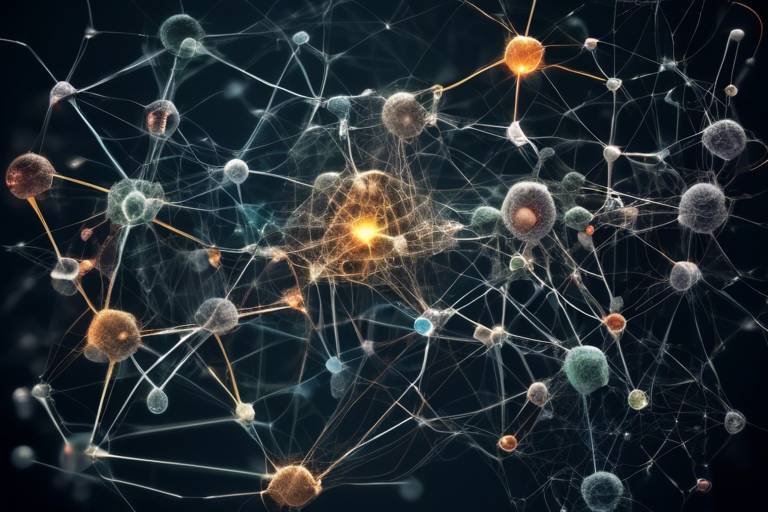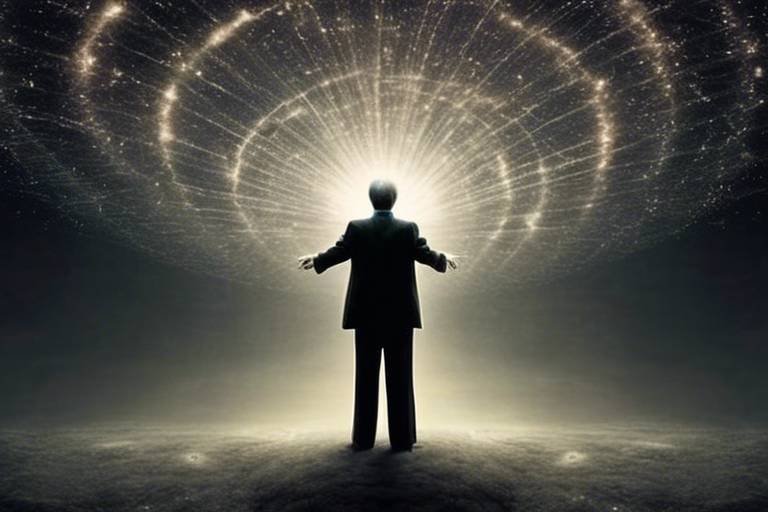Studying Consciousness through Metaphysics
Have you ever found yourself pondering the depths of your own mind? The nature of consciousness is a mystery that has intrigued philosophers, scientists, and curious individuals alike for centuries. It’s not just about being aware or having thoughts; it’s about understanding what consciousness really is and how it fits into the grand puzzle of reality. This article dives into the intricate relationship between consciousness and metaphysics, exploring various philosophical perspectives and theories that seek to unravel the essence of consciousness and its implications for our understanding of existence.
At its core, consciousness is a complex phenomenon that raises profound questions: Is it merely a byproduct of brain activity, or is it something more profound? Some argue that consciousness is the ultimate reality, while others view it as a fleeting experience tied to physical processes. As we embark on this exploration, we will encounter different interpretations and frameworks that philosophers have proposed over the years. Each perspective offers a unique lens through which we can examine our conscious experience and its connection to the universe.
As we delve deeper, we will uncover the metaphysical theories that have shaped our understanding of consciousness. From dualism, which posits a separation between mind and body, to physicalism, which asserts that everything can be explained through physical processes, each theory presents its own set of implications and challenges. We will also explore idealism, a perspective that suggests consciousness is fundamental to reality itself. By examining these theories, we can begin to appreciate the richness and complexity of consciousness and its role in shaping our perception of the world.
So, whether you're a philosophy buff, a science enthusiast, or just someone curious about the nature of existence, this journey into the world of consciousness through metaphysics promises to be enlightening. Get ready to question, ponder, and perhaps even redefine your understanding of what it means to be conscious in a universe that is as mysterious as it is fascinating.
- What is consciousness? Consciousness refers to the state of being aware of and able to think about one's own existence, thoughts, and surroundings.
- How does metaphysics relate to consciousness? Metaphysics explores the fundamental nature of reality, including concepts like existence, being, and the relationship between mind and matter, which are crucial for understanding consciousness.
- What are the main theories of consciousness? The main theories include dualism, which separates mind and body; physicalism, which views consciousness as a product of physical processes; and idealism, which posits that consciousness is fundamental to reality.
- Why is studying consciousness important? Understanding consciousness can help us explore our own existence, improve psychological practices, and even influence philosophical debates about what it means to be alive.

The Nature of Consciousness
Understanding consciousness is like trying to grasp smoke with your bare hands; it’s elusive, complex, and deeply entwined with our very existence. At its core, consciousness is the state of being aware of and able to think about one’s own existence, thoughts, and surroundings. But what does that truly mean? Is consciousness merely a byproduct of brain activity, or does it represent something much more profound? This question has puzzled philosophers, scientists, and thinkers for centuries.
To dive deeper, we can explore various interpretations of consciousness. Some argue that it arises from the intricate workings of the brain, a perspective known as physicalism. This view suggests that our thoughts, emotions, and experiences are nothing more than the result of neurons firing and biochemical processes. Imagine a computer: it processes data and produces outputs based on its programming. Similarly, proponents of physicalism believe our minds operate in a comparable way, functioning as a complex biological machine.
On the other hand, there are those who believe that consciousness is fundamental to the universe, a view often associated with idealism. This perspective posits that consciousness shapes reality itself, suggesting that our perceptions and experiences are not merely reflections of an external world but rather constructs that help us navigate our existence. In this light, consciousness is not just a byproduct; it is the very fabric of reality. Think of it as an artist painting a canvas—without the artist's vision, the canvas remains blank and devoid of meaning.
Additionally, the question of whether consciousness is a singular phenomenon or exists on a spectrum adds another layer to this complex discussion. Some theorists propose that consciousness can be divided into different levels, from basic awareness in animals to the more complex self-reflective consciousness found in humans. This idea prompts us to consider:
- What constitutes higher levels of consciousness?
- How do different beings experience and interpret their consciousness?
- Can machines ever achieve a form of consciousness similar to humans?
As we navigate through these interpretations, it becomes evident that consciousness is not a simple topic. It intertwines with philosophy, neuroscience, psychology, and even spirituality. Each discipline offers unique insights that contribute to our understanding of what it means to be conscious. The quest to unravel the nature of consciousness is ongoing, and as we delve deeper, we find ourselves asking even more profound questions about the essence of reality and our place within it.
Ultimately, the nature of consciousness invites us to reflect on our own experiences. Have you ever had a moment of clarity that felt transcendent? Or perhaps a time when you felt completely disconnected from your surroundings? These experiences highlight the rich tapestry of consciousness, suggesting that it is not merely a biological function but an intricate interplay of awareness, perception, and existence. As we continue to explore this fascinating topic, we may uncover new dimensions of understanding that challenge our preconceived notions about what it means to be conscious.

Metaphysical Perspectives
When we dive into the realm of metaphysics, we find ourselves navigating a complex web of theories that attempt to unpack the enigma of consciousness. Metaphysics, at its core, seeks to understand the fundamental nature of reality, and consciousness plays a pivotal role in this quest. The interplay between consciousness and reality raises profound questions: Is consciousness merely an epiphenomenon of physical processes, or does it hold a more central place in the fabric of existence? To tackle these questions, let's explore three prominent metaphysical perspectives: dualism, physicalism, and idealism.
Each of these frameworks offers a unique lens through which to examine consciousness, shaping our understanding of what it means to be aware and experience the world. For instance, dualism posits a separation between the mind and body, suggesting that our mental states exist independently from our physical being. This perspective invites us to consider the implications of such a divide: if our thoughts and feelings are distinct from our physical selves, how do they interact? On the other hand, physicalism argues that everything, including consciousness, can be reduced to physical processes within the brain. This view aligns closely with contemporary neuroscience, which seeks to map out the neural correlates of consciousness, illuminating the biological underpinnings of our subjective experiences.
Lastly, we have idealism, a perspective that flips the script by asserting that consciousness is not just a byproduct of physical processes but rather a fundamental component of reality itself. According to idealists, the world we perceive is shaped by our consciousness, suggesting that our thoughts and perceptions actively contribute to the construction of reality. This idea can be both liberating and perplexing, as it challenges us to reconsider our relationship with the world around us.
To summarize the key metaphysical perspectives on consciousness, we can look at the following table:
| Perspective | Key Concept | Implications for Consciousness |
|---|---|---|
| Dualism | Separation of mind and body | Challenges in explaining interaction between mental and physical states |
| Physicalism | Consciousness as a physical phenomenon | Supports a scientific approach to understanding subjective experience |
| Idealism | Consciousness as fundamental to reality | Reality is shaped by our perceptions and thoughts |
As we explore these metaphysical perspectives, we begin to appreciate the rich tapestry of thought that surrounds the study of consciousness. Each perspective not only provides insights into the nature of consciousness but also raises further questions about the essence of reality itself. How do these frameworks interact with each other? Can they coexist, or must we choose one over the others? The answers to these questions remain elusive, yet they invite us to delve deeper into the mysteries of our existence.
- What is dualism in relation to consciousness? Dualism is the belief that the mind and body are separate entities, leading to questions about how they interact.
- How does physicalism explain consciousness? Physicalism asserts that consciousness arises solely from physical processes in the brain.
- What does idealism propose about reality? Idealism suggests that consciousness is fundamental to reality, meaning our perceptions shape the world around us.

Dualism: Mind vs. Body
When we dive into the concept of dualism, we're stepping into a fascinating realm where the mind and body are seen as two distinct entities. Imagine your mind as a vibrant universe filled with thoughts, emotions, and dreams, while your body is the physical vessel that navigates through the material world. This separation raises intriguing questions: Can our mental experiences exist independently of our physical forms? Or is there an intricate connection that binds them together? Dualism, championed by philosophers like René Descartes, suggests that the mind is non-physical and fundamentally different from the body, leading to the classic mind-body problem.
Descartes famously declared, “I think, therefore I am,” emphasizing the primacy of thought and consciousness over the physical body. This perspective posits that while our bodies may be subject to the laws of physics, our minds operate in a different realm, one that is not easily explained by mere biological processes. This dualistic view has profound implications for how we understand consciousness. It suggests that our thoughts and experiences are not just byproducts of brain activity but are instead part of a separate, non-material essence.
However, this idea isn’t without its challenges. Critics of dualism argue that if the mind and body are separate, how do they interact? For instance, when you stub your toe, your immediate mental reaction is pain, yet this pain must somehow be communicated to your brain. This interaction raises a multitude of questions about the nature of consciousness and the mechanisms that connect our mental states to our physical experiences.
To illustrate this, consider the following table that summarizes some key points of dualism:
| Aspect | Dualism | Physicalism |
|---|---|---|
| Definition | Mind and body are distinct entities. | Everything can be explained through physical processes. |
| Key Proponent | René Descartes | David Armstrong |
| Main Challenge | Mind-body interaction problem. | Reductionism and subjective experience. |
| Implications | Potential for life after death, free will. | Consciousness as an emergent property of brain function. |
As we explore dualism further, it's essential to recognize the historical context that shaped these ideas. Descartes' work laid the groundwork for centuries of philosophical debate, influencing not only the field of philosophy but also psychology and neuroscience. Yet, as science has progressed, many have turned to physicalism, arguing that our understanding of consciousness must be grounded in the physical workings of the brain.
In conclusion, dualism presents a compelling perspective on the mind-body relationship, inviting us to ponder the essence of consciousness and its place in the universe. It challenges us to consider whether our thoughts are merely echoes of neural activity or if they represent something more profound. As we continue to unravel the mysteries of consciousness, the dialogue between dualism and its critiques will undoubtedly play a crucial role in shaping our understanding of reality.
- What is dualism? Dualism is the philosophical view that the mind and body are distinct and separate entities.
- Who is a key figure in dualism? René Descartes is often considered a foundational figure in dualistic philosophy.
- What are the main challenges to dualism? The primary challenge is the mind-body interaction problem, questioning how two distinct entities can influence each other.
- How does dualism compare to physicalism? Dualism posits a non-physical mind, while physicalism argues that everything, including consciousness, can be explained through physical processes.

Historical Context of Dualism
To grasp the essence of dualism, we must embark on a journey through history, tracing the thoughts of influential philosophers who have shaped our understanding of the mind-body relationship. Dualism, the notion that mind and body exist as separate entities, finds its roots in the works of René Descartes, a 17th-century French philosopher. Descartes famously declared, "Cogito, ergo sum" or "I think, therefore I am," which emphasizes the primacy of consciousness as the foundation of existence. This assertion not only sparked a philosophical revolution but also laid the groundwork for the dualistic perspective that continues to influence discussions on consciousness today.
Descartes proposed a model where the mind, an immaterial substance, interacts with the physical body, suggesting a complex relationship that raises numerous questions. How does an intangible mind influence a tangible body? This enigma has perplexed thinkers for centuries. Following Descartes, other philosophers like Gottfried Wilhelm Leibniz and Baruch Spinoza offered their interpretations of dualism, each adding layers of complexity to the discourse. Leibniz introduced the concept of monads, asserting that everything is made up of simple substances that do not interact causally. In contrast, Spinoza proposed a more integrated view, suggesting that mind and body are two attributes of the same substance.
Throughout the 19th and 20th centuries, dualism faced scrutiny from emerging scientific perspectives. The advent of neuroscience began to challenge the dualistic view, as researchers uncovered the intricate workings of the brain and its undeniable influence on behavior and thought. This led to a growing consensus among many scientists and philosophers that consciousness could be fully explained through physical processes, thereby diminishing the appeal of dualism.
Despite these challenges, dualism has persisted in various forms. Modern proponents argue that subjective experiences—those rich, personal narratives that define our consciousness—cannot be wholly reduced to physical explanations. They contend that the qualitative aspects of these experiences, known as qualia, remain elusive within a purely physicalist framework. This ongoing debate highlights the tension between dualistic and physicalist perspectives, illustrating the complexity of understanding consciousness.
In summary, the historical context of dualism is rich and multifaceted, shaped by the thoughts of brilliant minds throughout the ages. From Descartes’ pioneering ideas to the critiques posed by modern neuroscience, dualism continues to provoke thought and inspire inquiry into the nature of consciousness. As we delve deeper into this philosophical labyrinth, we must consider the implications of these theories not just for our understanding of consciousness, but for the broader questions of existence itself.
- What is dualism? Dualism is the philosophical position that mind and body are distinct entities, each with its own properties.
- Who is the father of dualism? René Descartes is often referred to as the father of dualism due to his influential ideas about the separation of mind and body.
- What are the criticisms of dualism? Critics argue that dualism fails to adequately explain how the mind and body interact and that consciousness can be fully understood through physical processes.
- How does dualism relate to modern neuroscience? Modern neuroscience challenges dualism by demonstrating the brain's role in shaping consciousness, suggesting that mental states are closely tied to physical brain activity.

Critiques of Dualism
While dualism has long been a prominent theory in the philosophy of mind, it faces significant critiques that challenge its validity and coherence. One of the primary criticisms comes from the perspective of physicalism, which argues that all phenomena, including consciousness, can be explained through physical processes. Critics highlight that dualism struggles to provide a satisfactory explanation for how two fundamentally different substances—the mental and the physical—interact. If the mind is non-physical, how does it influence physical actions, such as moving an arm or speaking? This question, often referred to as the interaction problem, poses a significant challenge for dualists.
Moreover, dualism tends to create a division that many argue is artificial. Some philosophers, like Daniel Dennett, suggest that this separation leads to a misunderstanding of consciousness itself. Dennett posits that consciousness is not a single entity but rather a collection of processes and functions that arise from brain activity. He argues that by adhering to dualism, we risk oversimplifying the complex nature of consciousness and ignoring the rich tapestry of cognitive processes that contribute to our experiences.
Another critique centers on the empirical evidence supporting physicalism. As neuroscience advances, it increasingly provides insights into how brain activity correlates with mental states. For instance, studies using brain imaging technologies demonstrate that specific thoughts and emotions correspond with identifiable neural patterns. This evidence suggests that consciousness may not be a separate entity but rather an emergent property of brain processes. Critics of dualism argue that as our understanding of the brain deepens, the need for a dualistic explanation diminishes.
Furthermore, the dualistic view can lead to problematic implications regarding the nature of human identity and agency. If the mind is entirely separate from the body, this raises questions about personal responsibility and moral accountability. For example, how do we reconcile actions taken by an individual when their mind is viewed as distinct from their physical self? This fragmentation can complicate our understanding of morality and ethics, leading to a potential disconnection between thought and action.
In summary, while dualism has played a significant role in the philosophical discourse surrounding consciousness, its critiques highlight fundamental issues regarding the interaction of mind and body, the implications of scientific findings, and the complexities of human identity. As we continue to explore the nature of consciousness, these critiques serve as essential considerations in the ongoing debate between dualism and its alternatives.
- What is dualism? Dualism is the philosophical view that the mind and body are distinct and separate entities.
- What are the main critiques of dualism? The main critiques include the interaction problem, the rise of empirical evidence supporting physicalism, and complications regarding moral responsibility.
- How does neuroscience challenge dualism? Neuroscience provides evidence that mental states correlate with brain activity, suggesting that consciousness may emerge from physical processes rather than existing as a separate entity.
- What is physicalism? Physicalism is the theory that everything, including consciousness, can be explained through physical processes and phenomena.

Physicalism and Consciousness
Physicalism, at its core, is the philosophical viewpoint that asserts everything in existence, including consciousness, can ultimately be explained through physical processes. Imagine consciousness as a complex symphony, where each instrument represents different aspects of brain activity and neural connections. This perspective suggests that our thoughts, feelings, and experiences are not separate entities floating in a metaphysical realm but rather the result of intricate biological mechanisms.
Recent advancements in neuroscience lend substantial support to physicalist views. For instance, studies employing neuroimaging techniques have shown that specific thoughts and emotions correspond to identifiable brain activity. This correlation raises intriguing questions: If our consciousness can be mapped to physical processes, does it imply that our subjective experiences are merely byproducts of neural interactions? Or is there more to the story?
To further understand the implications of physicalism, we can consider how it reshapes our perception of the mind-body relationship. Here are a few key points to ponder:
- Reductionism: Physicalism often adopts a reductionist approach, suggesting that complex phenomena, including consciousness, can be understood by dissecting them into their simpler, constituent parts.
- Objective Reality: This perspective emphasizes an objective reality where consciousness is a function of brain states, challenging the notion of a separate, non-physical mind.
- Scientific Inquiry: Physicalism encourages a scientific exploration of consciousness, pushing for empirical evidence and testable theories rather than relying on abstract philosophical speculation.
However, while physicalism provides a robust framework for understanding consciousness, it is not without its challenges. Critics argue that reducing consciousness to mere physical processes overlooks the qualitative aspects of experiences—what philosophers refer to as "qualia." How can we fully comprehend the richness of our subjective experiences if they are merely the result of biochemical reactions? This ongoing debate between physicalists and their critics highlights the complexities of consciousness, making it a compelling subject of study.
In conclusion, physicalism presents a powerful lens through which we can explore consciousness, grounding our understanding in scientific inquiry and biological processes. Yet, it also invites us to consider the limitations of a purely physicalist approach. As we delve deeper into the mysteries of consciousness, the dialogue between physicalism and alternative perspectives continues to evolve, revealing the intricacies of what it means to be conscious in a physical world.
- What is physicalism? Physicalism is the philosophical viewpoint that everything, including consciousness, can be explained through physical processes.
- How does neuroscience support physicalism? Neuroscience provides evidence that specific thoughts and feelings correlate with identifiable brain activity, suggesting a physical basis for consciousness.
- What are the criticisms of physicalism? Critics argue that physicalism fails to account for the qualitative aspects of consciousness, such as feelings and experiences, which may not be fully explained by physical processes alone.

Idealism and Consciousness
When we dive into the world of idealism, we encounter an intriguing proposition: consciousness is not just a byproduct of our physical existence but is, in fact, fundamental to the very fabric of reality itself. Imagine for a moment that everything we perceive—the vibrant colors of a sunset, the taste of your favorite meal, or the warmth of a loved one's embrace—is not merely the result of physical processes, but rather manifestations of a deeper, conscious experience. This perspective challenges the conventional understanding of existence, suggesting that our minds play a pivotal role in shaping the world around us.
At its core, idealism posits that the universe is essentially mental, and that physical objects are dependent on the perception of a conscious observer. This leads to profound implications regarding the nature of reality. If consciousness is indeed the foundation of existence, then our thoughts, beliefs, and perceptions become powerful tools that shape our experiences. In this light, the act of perceiving is not a passive experience; instead, it transforms how we engage with the world. This perspective invites us to consider questions such as: What if our thoughts could alter reality? What if our consciousness is the lens through which we create our experiences?
One of the most fascinating aspects of idealism is its application in various fields. For instance, in psychology, the understanding that our mental states can influence our physical health has led to the development of therapies that focus on the power of positive thinking and mindfulness. Similarly, in spirituality, many traditions teach that consciousness and intention can shape our reality, encouraging practices such as meditation and visualization. These applications highlight the potential for idealism to enrich our understanding of human experience and the interconnectedness of mind and matter.
However, idealism is not without its challenges. Critics often argue that it struggles to explain the objective nature of reality and the existence of an external world independent of our perception. For example, if everything is a projection of consciousness, how do we account for the consistent and shared experiences of individuals? This question leads to a deeper inquiry into the nature of existence and whether there is a reality that exists outside of our conscious experience.
To summarize, idealism presents a captivating framework for understanding consciousness and its implications for reality. By viewing consciousness as a primary force, we open the door to a richer exploration of our experiences and their impact on the world. Yet, as we embrace this perspective, we must also grapple with the critiques and challenges it presents, ensuring a balanced approach to the complex relationship between consciousness and reality.
- What is idealism in philosophy? Idealism is a philosophical perspective that posits that reality is fundamentally mental or consciousness-based, suggesting that the material world is dependent on perception.
- How does idealism relate to consciousness? Idealism asserts that consciousness is not simply a product of physical processes but is central to the existence and structure of reality itself.
- What are some criticisms of idealism? Critics argue that idealism struggles to explain the objective nature of reality and the existence of an external world independent of our perceptions.

Applications of Idealism
Idealism, with its assertion that consciousness is fundamental to reality, has profound implications across various fields. This philosophical perspective doesn’t just remain confined to the realm of abstract thought; it spills over into practical applications that can reshape our understanding of psychology, spirituality, and even our everyday experiences. Think about it: if consciousness shapes reality, then our perceptions, beliefs, and thoughts hold immense power in influencing the world around us.
In the field of psychology, idealism encourages a more introspective approach to mental health. Therapies that focus on cognitive restructuring, for instance, emphasize how our thoughts and beliefs can alter our emotional states and, consequently, our experiences. By harnessing the power of consciousness, individuals can learn to reshape their realities, leading to improved mental well-being. This aligns with the idea that our internal world significantly affects our external circumstances.
Moving on to spirituality, idealism offers a framework for understanding the interconnectedness of all beings. It suggests that our consciousness is not just a solitary experience but part of a larger, collective consciousness. This perspective fosters a sense of unity and compassion, encouraging people to recognize their shared existence. In practices like meditation and mindfulness, the idealist view reinforces the belief that by altering our consciousness, we can create a more harmonious reality.
Moreover, idealism has implications for our understanding of reality itself. It challenges the traditional view that the physical world is separate from our perceptions. Instead, it proposes that reality is a conscious experience, shaped by our thoughts and intentions. This notion can be particularly empowering, as it suggests that we are not merely passive observers of life but active participants in creating our own realities.
To illustrate these applications further, consider the following table that summarizes the key areas where idealism plays a significant role:
| Field | Application of Idealism |
|---|---|
| Psychology | Focus on cognitive restructuring to improve mental health. |
| Spirituality | Encourages a sense of unity and interconnectedness among individuals. |
| Reality Perception | Promotes the idea that consciousness shapes our understanding of reality. |
In conclusion, the applications of idealism extend far beyond philosophical debates. They touch on the very core of human experience, suggesting that our consciousness is a powerful tool for shaping not just our lives but the world around us. By embracing this perspective, we can unlock new potentials for personal growth, social connection, and a deeper understanding of existence itself.
- What is idealism? Idealism is a philosophical perspective that posits that consciousness is fundamental to reality, suggesting that our perceptions and thoughts shape the world we experience.
- How does idealism influence psychology? Idealism influences psychology by emphasizing the importance of thoughts and beliefs in shaping emotional states and overall mental health.
- Can idealism affect our daily lives? Yes, idealism can affect daily lives by encouraging individuals to recognize their power in shaping their realities through consciousness.

Critiques of Idealism
While idealism presents a fascinating perspective on the nature of consciousness and reality, it is not without its critics. Many philosophers and scientists argue against the notion that consciousness is the primary substance of existence. One of the main critiques revolves around the idea that idealism struggles to effectively explain the objective nature of reality. For instance, if consciousness shapes reality, what happens when we are not consciously observing something? Does that mean it ceases to exist? This question raises significant doubts about the validity of idealism as a comprehensive explanation of our world.
Another point of contention is the challenge of reconciling idealism with the physical world. Critics argue that idealism often leads to a form of solipsism—the belief that only one's mind is sure to exist. This can be a slippery slope, as it might suggest that other minds and the external world are mere projections of one’s own consciousness. Such a view can be isolating and counterintuitive, especially when considering the vastness of the universe and the shared experiences among individuals.
Moreover, idealism faces significant challenges when attempting to explain the existence of an external world that operates independently of our perceptions. For example, if a tree falls in a forest and no one is there to hear it, does it make a sound? This classic philosophical question highlights the dilemma idealists face in justifying the existence of phenomena beyond human awareness. Critics argue that idealism fails to account for the consistency and predictability of natural laws that govern the universe, suggesting that these laws exist regardless of human consciousness.
To further illustrate the critiques of idealism, let’s take a look at some of the most prominent arguments against it:
- Dependence on Empirical Evidence: Many argue that idealism lacks empirical support. Unlike physicalism, which is grounded in observable phenomena, idealism often relies on subjective experience, making it difficult to validate scientifically.
- Interpersonal Verification: Critics emphasize that idealism cannot adequately explain how different individuals can experience similar external realities independently of one another. If consciousness shapes reality, why do we all perceive the same physical world?
- Complexity of the External World: The complexity and intricacy of the universe suggest a reality that is far more than just a product of human consciousness. Idealism may oversimplify the rich tapestry of existence.
In conclusion, while idealism offers a compelling narrative about the role of consciousness in shaping reality, its critiques raise essential questions regarding the nature of existence, the objectivity of the universe, and the validity of subjective experiences. As we continue to explore these philosophical realms, it becomes clear that understanding consciousness requires a nuanced approach that considers multiple perspectives, including the insights offered by idealism and its critiques.
1. What is idealism in philosophy?
Idealism is a philosophical perspective that posits that reality is fundamentally mental or immaterial, asserting that consciousness shapes the nature of existence.
2. What are the main critiques of idealism?
Critiques of idealism include its inability to explain the objective nature of reality, the challenge of solipsism, and the lack of empirical evidence supporting its claims.
3. How does idealism compare to physicalism?
Idealism suggests that consciousness is primary, while physicalism asserts that everything, including consciousness, can be explained through physical processes and phenomena.
4. Can idealism coexist with scientific understanding?
While some argue that idealism conflicts with scientific principles, others believe that a synthesis of both perspectives can lead to a more comprehensive understanding of consciousness and reality.
Frequently Asked Questions
- What is consciousness?
Consciousness is often described as the state of being aware of and able to think about one's own existence, thoughts, and surroundings. It's a complex phenomenon that raises questions about its nature and origin. Is it merely a byproduct of brain activity, or is it something more profound? This topic has been debated by philosophers, scientists, and thinkers for centuries.
- How does metaphysics relate to consciousness?
Metaphysics provides various frameworks for understanding consciousness. It explores the fundamental nature of reality and existence, often questioning the relationship between mind and body. Key metaphysical theories, such as dualism and physicalism, offer different perspectives on how consciousness fits into the broader picture of reality.
- What is dualism, and how does it impact our understanding of consciousness?
Dualism is the philosophical view that mind and body are distinct entities. This perspective suggests that mental states are not reducible to physical states. It raises intriguing questions about the nature of consciousness, particularly regarding how we reconcile our mental experiences with physical processes. Historical figures like Descartes have significantly influenced this debate.
- What are the critiques of dualism?
Critics of dualism argue that it fails to adequately explain the relationship between mental and physical states. Physicalists, for example, contend that consciousness should be understood through physical processes, challenging the dualistic separation of mind and body. This ongoing discourse highlights the complexity of understanding consciousness.
- What is physicalism, and how does it relate to consciousness?
Physicalism posits that everything, including consciousness, can be explained through physical processes. This view is supported by contemporary neuroscience, which examines how brain activity correlates with conscious experience. It suggests that understanding the brain's workings can shed light on the nature of consciousness itself.
- What is idealism, and how does it redefine our understanding of reality?
Idealism is the philosophical perspective that consciousness is fundamental to reality. It posits that our perceptions and experiences shape the world around us. This view challenges traditional notions of an objective reality, emphasizing the role of consciousness in shaping our understanding of existence.
- What are the applications of idealism?
Idealism has practical implications across various fields, including psychology and spirituality. It encourages us to explore how our thoughts and beliefs influence our experiences and interactions with the world. This perspective can lead to transformative insights into personal development and the nature of reality.
- What are the critiques of idealism?
Critics of idealism argue that it struggles to explain the objective nature of reality and the existence of an external world independent of consciousness. They raise questions about how idealism can account for shared experiences and the physical laws governing our universe. This debate continues to provoke thought and discussion.



















